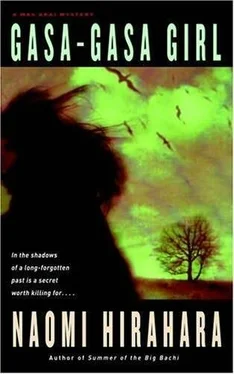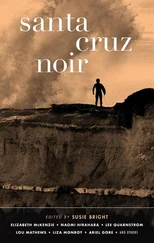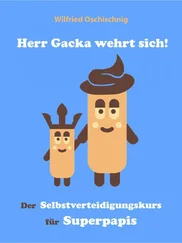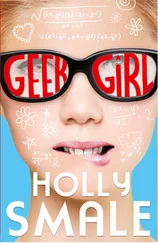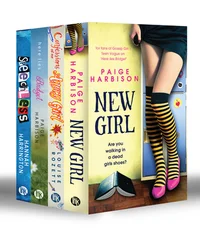The girl looked confused and bit the side of her lip.
“I wouldn’t want to come here with a warrant. That would cause all sorts of problems for your boss.”
“Well, I guess it wouldn’t hurt to just look.” The girl finally caved in.
“A delivery to Kazzy Ouchi,” Tug said quickly, so as not to lose momentum. “ Prospect Park.”
The girl’s nimble fingers tapped the keyboard.
“Yes, there was a delivery to Kazzy Ouchi on Thursday.”
“From whom?”
“Somebody named Anna Grady.”
Anna Grady, thought Mas. Kazzy’s ex-girlfriend.
“Wait a minute. I remember this. I took the order over the phone.” The girl continued staring at the computer screen.
“You have her address?” Tug asked
“Yes, Fort Lee, New Jersey.”
Tug stepped behind the flower shop girl and noted the address in a small spiral notebook he kept in his shirt pocket.
“What’s that?” he asked, pointing to something on the screen.
“Oh, she wanted a note with the gardenia. That’s right. I remember now. She kept changing it. She finally came up with this.”
“‘Meet me in the garden at eight tonight,’” Tug read out loud.
Mas forgot that he wasn’t supposed to know English. “Thursday?” he reconfirmed.
The girl nodded her head. “Yes, last Thursday. Is that important?”
***
“Thursday the day Kazzy shot dead,” Mas said as they walked toward the underground apartment. “Girlfriend somehow connected.” Tug’s feet were swollen in his new tennis shoes, so he trudged behind Mas, a few steps back.
“Yes, I was thinking the same thing.” Tug stopped at the corner and leaned his hand on a neighboring brownstone. “My feet are aching, Mas. How are you holding up?”
Miraculously, Mas’s hand didn’t smart anymore, and even his stomachache had gone away. Mas figured that he had extra-strong white blood cells, perhaps enhanced from the radiation of the Bomb.
He told Tug that he could soak his feet in Mari and Lloyd’s bathtub, for which Tug seemed eternally grateful. “I’m getting tired of Joy’s brown water,” he explained.
As Mas opened the gate and door of the underground apartment, he remembered a moment at the flower shop.
“Whatsu dat ID you show the girl?” he asked Tug.
“Oh.” Tug smiled. “It was my old health inspector badge. Just covered up the side that said Department of Health.”
Mas laughed and let Tug into the underground apartment. He pointed through the bedroom to the bathroom and then checked the refrigerator. Empty, aside from a half-empty carton of soy milk and various bottles of mustards, sauces, and pickles. Luckily, in the freezer was a plastic bag of leftover rice. As he heard water running in the bathtub, he brewed some green tea and microwaved the rice. He poured the steaming tea over the rice in two rice bowls. He was delighted to find a small bottle of umeboshi on the refrigerator door shelf and floated a couple of the red pickled plums in his rice concoction.
Tug walked barefoot through the house, leaving traces of water on the hardwood floor. When he saw the rice bowls, his eyes crinkled in a smile. “ Ochazuke, ” he said. “Just like home.”
They slurped down the rice and bit into the pickled plums.
“You think you could live in a place that has no Little Tokyo, Japantown, or J-town?” Tug asked.
“I dunno,” Mas said. “How about you?”
Tug shared that he had been in New York three times, the first time after he had been honorably discharged from the Army in 1946. Instead of heading straight back to what was left of the farm in San Dimas, California, he spent a good two weeks with his Army buddies near Spanish Harlem on Riverside Drive, where most of the Nisei had congregated during the war. Some were college students, and others became two-bit international traders dealing in cheap china figurines or silk. A group of them went dancing at the Ninety-second Street YMCA with Nisei girls wearing their hair rolled up on the sides (Tug, of course, never forgetting about Lil, who was back in Los Angeles with her folks).
“I tell you, Mas, I felt like a country boy.”
“Well, where you from, pretty inaka back then. Nutin’ there.”
“That’s true,” Tug said. “Those New York Nisei, something else, I tell you. Risk takers. Big dreamers. But you know me, Mas. I’m not much of a gambler. All I wanted to see were green fields, foothills, and San Gabriel Mountains.”
Mas spit the plum seed into his fingers.
“But they think we California Nisei are small-minded, boxed in,” said Tug.
“Maybe.”
“So what if we are a little stuck in our ways?”
Mas agreed with Tug. The West Coast Nisei had more to fight against; hadn’t the Yamadas themselves had to reinvent themselves after they lost the chili pepper farm? They never regained their prewar success.
As Mas washed the chawan bowls, Tug sat on the couch and was rewriting Anna’s name and address on another piece of paper when Mari entered the apartment.
“Lloyd told me that he would stay overnight at the hospital,” she said. Looking over Tug’s shoulder, she read, “‘Anna Grady.’ Sounds familiar. Wasn’t that Kazzy’s ex-girlfriend?”
Mas nodded.
“I never met her, but Lloyd has. Kazzy even told Lloyd that he was thinking of marrying her. Why do you have her address?”
Mas let Tug tell the news. It had been his fake ID, after all, that had forced the hand of the flower shop girl. “It turns out she sent Ouchi a flower and a note that she wanted to meet with him at the garden the night he was killed,” Tug announced, wiggling his toes.
“The gardenia,” Mari murmured, and Tug nodded again. As Mari listened to the whole story, Mas saw a familiar look of determination on her face. “Lloyd will be with Takeo. I say that we go over there and talk to Anna Grady.”
“I’m kind of worn-out, Mari,” Tug said. “How about tomorrow?”
“This can’t wait.” Mari was driven to find the answer. “How about you, Dad? Ready for a bus ride?”
***
Mas had taken the bus a few times before in Los Angeles, but that was when it had been known as the RTD, not all the fancy names it was called today. Now in Southern California there were bright-red buses called Rapid; small buses, which just circled downtown L.A.; and sky-blue buses, which traveled all the way to Santa Monica, just blocks away from the Pacific Ocean. Even Pasadena had a free bus line, with vehicles elaborately painted with images of jazz singers to prove that the city had some culture. It was as if you needed to trick people to ride the bus.
Mari claimed that the New Jersey Transit was the fastest way to travel to Fort Lee, New Jersey, from Manhattan. Fort Lee sounded like an old military unit, a fortress made of wooden logs and manned by soldiers wearing moccasins and carrying rifles.
They took the underground train to the Port Authority Terminal on Forty-second Street, and from there a bus. The bus looped south and then traveled north, passing the bare gray trees of Central Park and the tall, high-tone apartments on the west side of the avenue. The sun was going down, but instead of the spectacular sunsets of smog-tainted Los Angeles, the grayness just got darker, like a shade being pulled down.
Several blocks later, the scene changed to dilapidated houses and a starkness that stripped Mas’s heart.
“ Columbia ’s not far from here,” Mari said.
Mas felt his mouth go dry. So they had spent thousands of dollars on a university in this neighborhood? “So youzu still like New York,” Mas stated more than questioned.
“Can’t go back to California. I know that the weather’s so much better. But we’ve become New Yorkers. And besides, we couldn’t afford any place in Los Angeles, either.”
Читать дальше
